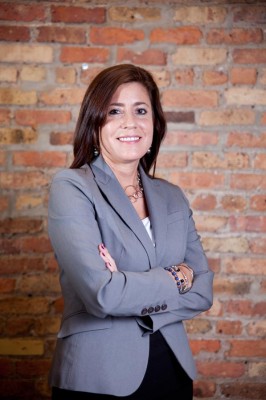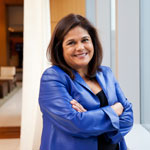Andrea Bazán never set out to be an advocate or community organizer, but you can’t fight fate. The senior vice president of resource development for United Way of Metropolitan Chicago shares her serendipitous path to service and outstanding leadership.
Andrea Bazán watched from the left side of the aisle as the young woman dressed in white made her way toward the altar in slow, measured steps. Only seven years earlier, the bride-to-be was an undocumented, yet promising, immigrant student from Raleigh, North Carolina, and Bazán a passionate, up-and-coming community activist. Advocating for the girl in front of the North Carolina General Assembly and Congress, Bazán became more than a lobbyist to the young woman, Nayely, and she more personal than the face of an underserved community.
It was 2005 when Bazán met Nayely. Serving as executive director and chief lobbyist for El Pueblo, a nonprofit benefitting the Latino community of Raleigh and promoting cross-cultural understanding, Bazán had brought El Pueblo a long way from the community festival it started as in 1994 while she was a graduate student at the University of North Carolinav (UNC) at Chapel Hill. With a career in public health and mother of one child with another on the way, El Pueblo became Bazán’s night-and-weekend pet project. “Everyone thought I was making a bad decision when I decided to leave my job and work full time at El Pueblo in early 2000,” she recalls. “El Pueblo was unknown. We had a small office and had to seek out funding. It was a fork in the road in my life, and I just did it.”
With a growing population of undocumented Latinos in North Carolina and the Southeast, Bazán saw more than the opportunity, but the necessity for programs in health care, education, public safety, literacy, voter registration, and culture. “I knew every day I was making a big difference,” Bazán says of her experience with El Pueblo. “It was not easy, but it wasn’t a job for me, at all.” After 11 years under her care, the organization grew to represent Latinos statewide and developed an official agenda pushed by Bazán, the first Latina lobbyist in the North Carolina General Assembly.

Though her time in her native Argentina was short, unrest was all she knew. Her parents tried to shelter her, but Bazán could not help but hear heated conversations behind closed doors, notice bombed-out buildings on her way to school, witness the changing of presidents not by the democratic process, but rather assassination, or see the face of her tío Mario on a magazine with the caption “Tied to the Subversive Movement.” Mario was a lawyer and defendant of student activists during the war.
When soldiers came to her home to inspect the books on her family’s shelves, the danger became personal. Her father, an internationally known scientist, made Bazán, her mother, and four siblings targets of suspicion. Forced to leave in haste, Bazán and her family could only pack a few suitcases before they caught a plane headed for New Orleans. All she knew of the place she was going was a black-and-white picture of the Superdome her parents had showed her in an encyclopedia. It wasn’t until years later that she found answers to the many questions any adolescent in her position would have had.
When Bazán entered her master’s program in social work at UNC, it was a serendipitous decision. At the encouragement of a professor, Bazán sought to define her history in the library. “I remember looking in a book and having real proof of what happened to [tío Mario] in Argentina during the Dirty War,” says Bazán of her uncle who was killed for his beliefs and actions. “The importance of knowing that information wasn’t so much that it revealed my uncle’s story, but that it allowed me to put together where I came from,” she says. Shortly after, she defined her destiny when she reluctantly agreed to organize what would become the first annual La Fiesta del Pueblo festival.
“I didn’t realize how important the festival would be,” Bazán says of the project that changed her life and the lives of many in Raleigh and beyond. “As soon as I became engaged with my work, it became extremely important to me.”
Taking the cause of advocacy for Hispanics beyond community organizing, Bazán was energized to bring the fight for driver’s licenses, health and housing rights, and in-state tuition to the political battleground on the general assembly floor. Though a bill for the latter did not pass, it brought to the forefront the issue of education for immigrant Latinos and inspired decision makers and the community to have an honest discourse on immigration. It also brought Bazán closer to Nayely, a high-achieving Latina girl who represented the educational potential of her community.
in 2005, Bazán made the decision to commit herself to a new project as president of Triangle Community Foundation (TCF), an organization addressing community issues in the Triangle Region of North Carolina through philanthropic measures. Bazán was introduced to a new world of advocates and people in need. No longer working exclusively on behalf of Latinos, she came to know the struggles and issues faced by North Carolina’s other underserved communities, as well as the allies she could turn to in the corporate sphere.
In her six years with TCF, Bazán grew the $147 million foundation’s assets by 45 percent. Combined with her leadership on the board of the National Council of La Raza, the largest Hispanic civil-rights organization in the United States, Bazán’s successful efforts to turn around the foundation earned her executive attention. In 2011, she was appointed to President Barack Obama’s Advisory Council on Faith-Based and Neighborhood Partnerships.
Having spent her career advocating from the outside, Bazán decided in 2012 to take up the cause internally by joining the Obama campaign for reelection, a decision that took her to Chicago—a city she had never been to—and set her on yet another fateful path. “Maybe because of my background I’m always thinking of the need,” Bazán says of her inclination to advocacy. “During the campaign, I didn’t know anything of Chicago beyond my walk to work, but as I talked to folks about the disparities among communities in the city, I realized that there was a reason the campaign brought me here.”
That reason was the United Way of Metropolitan Chicago where she joined the team as senior vice president of resource development less than a month after the president won his second term. She came aboard at a tumultuous time for the city, amid teacher strikes that made national news. With the first installment of the Live United 2020 campaign—a 10-year endeavor to deliver income, education, and health-care services to metropolitan Chicago’s poverty-stricken communities—taking root in the city’s Brighton Park neighborhood in March 2013.
When young people ask her how she did it—become a community advocate, build a grassroots organization, and affected change for entire communities—Bazán says it was such a personal journey, that it can’t be replicated like a template. Her advice to those who seek it: get involved in something that matters to them and do something—anything—to make a difference.
“Maybe it’s a little bit of our family-oriented, Hispanic culture as well,” Bazán muses. “We don’t ask, ‘What’s in it for me?’ but rather, [we] consider those around us. That’s what I tell my daughters and people who ask.”
While Bazán is allowing her trajectory to take her where it may, her passion is clear. Whether genetic, fated, or a combination of the two, her commitment to those she serves make her more than just an advocate; they make her a leader.
Check out all of Hispanic Executive‘s 2013 Top 10 Líderes here.

